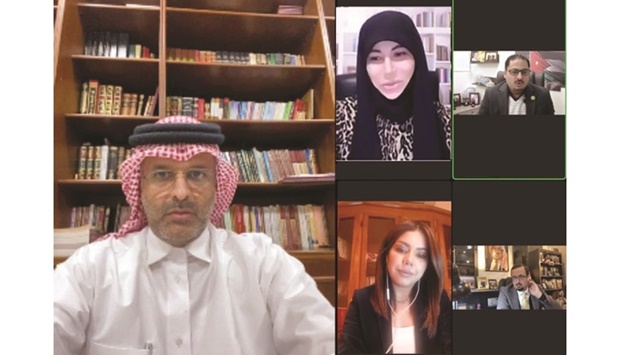The Qatar International Centre for Conciliation and Arbitration (QICCA) at Qatar Chamber recently participated in a regional webinar titled ‘Responsible Governance in Labour Law’, which was organised by Innovation Dome Consulting & Training in Jordan.
QICCA board member for International Relations Sheikh Dr Thani bin Ali al-Thani participated as guest of honour during the webinar, which is part of the 11th Zad Knowledge Council.
Sheikh Thani said Qatar’s labour laws have witnessed numerous reforms since Labour Law No 3 of 1962, and subsequent laws, such as Law No 11 of 1962 for the Establishment of the Commercial Registry System and laws amending it, Law No 3 of 1963 concerning the Regulation of Foreigners’ Entry and Residence in Qatar and laws amending it, Law No 3 of 1984 Regulating the Sponsoring of the Residence and Exit of Foreigners, which was amended by Law No 21 of 2002 and Law No 14 of 1992 on the Regulation of the Recruitment of Workers from Abroad for Others.
Other include Law No 23 of 1994 with respect to the Compounding Regulation of the Crimes stipulated in Law No 14 of 1992 on the Regulation of Recruitment of Workers from Abroad for other Parties, Law No 7 of 1999 regulating the Ministry of Civil Service and Housing Affairs and specifying its Functions, and Law No 5 of 2002 promulgating the Law of Commercial Companies.
Sheikh Thani also said since Qatar won the 2022 FIFA World Cup bid, some foreign newspapers and human rights organisations started to attack Qatar on the pretext of violating workers' rights, but these attacks ignored the reforms witnessed by the labour market in the State.
Elaborating on such reforms, Sheikh Thani noted that the Qatari labour market witnessed significant reforms, especially in 2013 and 2014 when the State established a wage protection system for workers ensuring labourers’ wages are transferred to banks within a maximum period of the fourth day of the month.
He noted that if the company does not transfer wages during that period, the services belonging to that company will be blocked and it will be referred to the Public Prosecution for non-payment of wages.
Sheikh Thani stressed that these reforms support and safeguard the rights of labourers in Qatar. Reforms also included cancelling the country’s exit permit system and allowing workers to change employers freely, he added.
Sheikh Thani said Qatar’s labour laws have witnessed numerous reforms since Labour Law No 3 of 1962, and subsequent laws, such as Law No 11 of 1962 for the Establishment of the Commercial Registry System and laws amending it, Law No 3 of 1963 concerning the Regulation of Foreigners’ Entry and Residence in Qatar and laws amending it, Law No 3 of 1984 Regulating the Sponsoring of the Residence and Exit of Foreigners, which was amended by Law No 21 of 2002 and Law No 14 of 1992 on the Regulation of the Recruitment of Workers from Abroad for Others.
Other include Law No 23 of 1994 with respect to the Compounding Regulation of the Crimes stipulated in Law No 14 of 1992 on the Regulation of Recruitment of Workers from Abroad for other Parties, Law No 7 of 1999 regulating the Ministry of Civil Service and Housing Affairs and specifying its Functions, and Law No 5 of 2002 promulgating the Law of Commercial Companies.
Sheikh Thani also said since Qatar won the 2022 FIFA World Cup bid, some foreign newspapers and human rights organisations started to attack Qatar on the pretext of violating workers' rights, but these attacks ignored the reforms witnessed by the labour market in the State.
Elaborating on such reforms, Sheikh Thani noted that the Qatari labour market witnessed significant reforms, especially in 2013 and 2014 when the State established a wage protection system for workers ensuring labourers’ wages are transferred to banks within a maximum period of the fourth day of the month.
He noted that if the company does not transfer wages during that period, the services belonging to that company will be blocked and it will be referred to the Public Prosecution for non-payment of wages.
Sheikh Thani stressed that these reforms support and safeguard the rights of labourers in Qatar. Reforms also included cancelling the country’s exit permit system and allowing workers to change employers freely, he added.

